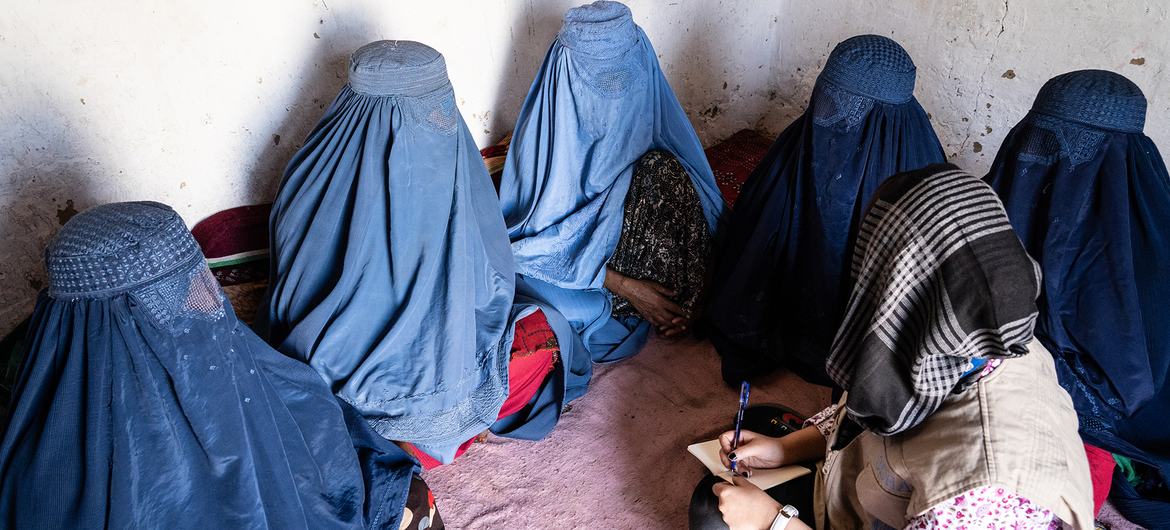Women's faces covered and beards for men: Taliban sharia is now law
Enforcement is overseen by the Ministry of Morality. Over the past year more than 13,000 people detained, half of them held for 24 hours. Specific rules are also provided for the media, such as a ban on showing images of living beings. Sanctions include counseling, warnings of divine punishment, verbal threats, confiscation of property, and detention.
Kabul (AsiaNews) - The ruling Taliban in Afghanistan, after issuing a series of controversial regulations restricting women's rights and cracking down on religious freedom, have in recent days formally approved the codification of a series of morality regulations covering several areas.
According to reports from the Ministry of Justice, several areas from clothing to daily life are in the crosshairs, starting from the obligation to cover the face for women and beards for men, to banning drivers of cars or public transportation from listening to music.
The rules, in line with the dictates of sharia (Islamic law), will be enforced by the Ministry of Morality and are based on a 2022 decree of the Taliban's supreme spiritual leader. They have been officially published for a few days now and have come into full effect, as announced by a Ministry of Justice spokesman.
The Ministry of Morality, formally called the Ministry for Prevention of Vice and Propagation of Virtue, has already implemented similar morality requirements and claims to have arrested thousands of people for violations.
It was not immediately clear whether the publication of the rules will lead to greater tightening. Nevertheless, the Taliban's restrictions on women and freedom of expression since returning to power in Afghanistan in the summer of 2021 have already drawn much (and harsh) criticism from rights groups and many foreign governments.
“Day after day, they are trying to erase women from society,” a 37-year-old housewife from Kabul named Halema told Reuters. “The silence of the international community,” she added, ”about the Taliban's actions encourages them to create new laws and restrictions every day.
Western chancelleries, led by Washington, have said the path toward formal recognition of Koranic students is blocked until they reverse course on women's rights and open high schools to girls, now banned. In contrast, the Taliban respond by saying they respect the rights of the pink universe, albeit declined according to “interpretation” of Islamic law and local customs, and that these are internal issues that need to be addressed at the local level.
The 35-article morality law was officially promulgated and published on Aug. 21 after being ratified by Supreme Spiritual Leader Haibatullah Akhundzada, as Justice Ministry spokesman Barakatullah Rasoli explains.
“According to this law, the Ministry (for the prevention of vice and propagation of virtue) is obligated,” he adds, ”to promote good and prohibit evil in accordance with Islamic shariah. Requirements include requiring women to wear clothes that completely cover their bodies and faces and prohibiting men from shaving their beards and skipping prayer and religious fasts.
Penalties for violations include “counseling, warnings of divine punishment, verbal threats, confiscation of property, detention from one hour to three days in public prisons, and any other punishment deemed appropriate.” If these measures fail to correct the behavior, additional sanctions are provided.
“Many of these rules were already in place, but in a less formal way, and now they are being made official. I think this is a sign of what we've seen over the last three years, which is a steady, gradual escalation of repression,” explained Heather Barr, associate director of the Women's Rights Division at Human Rights Watch (Hrw).
The laws also prevent drivers of cars, starting with cabs, from transporting women without a male guardian, as well as a special section on media and information, which is also subject to Sharia law. There is also a ban on publishing images of living beings.
This week the Ministry of Morality said it had arrested more than 13,000 people in the past year, without specifying the (alleged) crimes committed or the gender of those detained, about half of whom were held for 24 hours.
The Taliban suspended Afghanistan's previous constitution when they took power in 2021, after the withdrawal of foreign forces, and declared that they would govern the country according to Sharia law.
According to the Ministry of Justice, this week's morality laws are the seventh set of codified regulations, with others covering property, financial services and the prevention of begging.
11/08/2017 20:05







.png)










